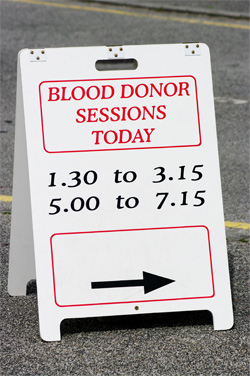America's Almost Out: Bizarre Secrets Of The Blood Industry

If you suddenly need lots of a stranger's blood in your body, you're either undergoing horrific trauma or are a vampire. If you donate the next time they roll that Red Cross trailer up to your office, remember that whoever winds up on the other end is probably having the worst day of their life (but hopefully not their last).
The reason the Red Cross is constantly trying to guilt you into donating blood is because the stuff is always in short supply -- sometimes desperately so. This creates a lot of drama and hard decisions, both when it comes to collecting the stuff and when transfusing it into another body. We talked to two transfusion specialists -- "Ann" and "Dr. Matthew" -- to find out how weird this can get.
Giving A Patient The Wrong Blood Type Can Have Awful Consequences

You know there are different blood types, and that they have to match types between donors and recipients. But do you know what happens if they get it wrong? Imagine your bloodstream spraying poison on your internal organs.

Ever accidentally pump your car full of diesel? That, but in your kidneys.
Blood types are like gang affiliations. Some get along fine, but others have whatever those especially passionate feuds are called. For example, if you have type A blood, your body will corner and beat to death any type B cells unfortunate enough to wander into your turf. The results for your body are fucking horrifying.
"This reaction is immediate and severe," Dr. Matthew explains. "Your immune system recognizes the foreign and attacks them via an antibody, which punches a hole in the membrane of the transfused foreign cells and them on the spot. The punctured red blood cells release the hemoglobin inside them, which is toxic to your kidneys. Once the kidneys start shutting down, all the other organ systems start going as well."

Despite looking like an explosion of streamers and joy, free-floating hemoglobin is a party you want no part of.
Your body's defenses don't work properly against foreign blood, and that's the best scenario for a botched transfusion. You knew that blood types have to be compatible, but did you know that you also have to check for allergies? "I once had a lady that had a bad allergic reaction after receiving plasma. It turns out she had a peanut allergy and the donor had ingested a PBJ prior to donating, which caused the patient to go into anaphylactic shock." Note: If that sounds like bullshit, it's not.
That's one of many reasons finding the right blood to transfuse is much more difficult than ensuring that you've selected the right type -- although that's tricky too, because there are far more types than you were taught, and some are all but impossible to find. "There are over 30 other blood groups other than your standard A, B, O, AB. There is even a blood type called 'Bombay' which naturally makes an antibody for every other blood type. People with this type cannot get blood from anyone except from others with Bombay. It's extremely rare -- about four in a million."

Giving your magic blood an ounce-for-ounce value somewhere between liquid gold and printer ink.
Yeah, if you lost that genetic lottery, don't expect the hospital to have any spare blood for you when you accidentally run your arm through a wheat thresher. You would think this would mean they would take any and all donors to cast as wide a net as possible, but ...
There Are Still Ridiculous Rules Against Men Who've Had Sex With Men

Considering the importance of transfusions, every donor should ideally be greeted with a hug from their favorite celebrity when they decide to show up and literally bleed for a complete stranger. But for decades, male donors have instead been greeted with intrusive questions like "Have you ever had another man's dick inside you?" and were shown the door if the answer was yes.

"Door is on your left. Would you prefer to leave to the sound of whispered accusations, or quiet glaring?"
"Since 1977, the FDA has not allowed men who have had sex with other men, even once, to donate blood," Dr. Matthew told us. "This was the result of the AIDS epidemic and the lack of knowledge and testing limitations. Well, now we've got a really good handle on HIV testing. Your chances of contracting HIV through transfusion is like one in two million." In others words, you have better odds of getting struck by lightning, and then discovering that the scar formed the shape of winning lottery numbers.
The ability to reliably test for HIV came about in 1985, and all blood donors are screened for it, so the FDA somewhat relaxed the rule prohibiting men who've had sex with men from donating ... in December 2015. "If haven't had sexual contact with a person at risk for HIV within the past year, they can donate."

"FINE! But this counts as your social progression for next Christmas, too."
Yep, monogamous, sexually active gay and bisexual men who use protection still can't donate, while heterosexuals who have nonstop nasty, unprotected sex can. This is despite the fact that modern tests only need a waiting period of 25 days after sex to detect signs of HIV, although that would still rule out any same-sex couples who weren't going through a bit of a rough patch. But to be fair, maybe the rules wouldn't be so strict if not for the fact that ...
Blood Donors Constantly Lie About Their Health

As hard as it is to get people to donate blood (more on that in a moment), why in the hell would people try to scam their way into giving, knowing that infected blood is useless at best and could kill somebody at worst?
"For me, the most common reason was to take advantage of a promotion," Dr. Matthew said. "We'd have people who absolutely knew they had hepatitis B or C donate because they wanted a Chick-Fil-A or Walmart gift card. They lie, donate, get their gift, and never come back again." Then there are people who use blood donation as a chance to get a free screening of their own health. "I once had a lady who had already been diagnosed with HIV donate blood and lie, just to see if her test still came back positive -- as if it would have magically become negative."

You'd think if that had any possibility of happening, they'd advertise it on the sign.
Dr. Matthew also encountered a bizarre example of peer pressure. "I had a high school donor fake parental consent so she could donate with friends. She had a seizure during the donation and had to be hospitalized. She had a disorder that she didn't reveal during screening, but she donated because she wanted to be with her friends." Remember, kids, if your friends only like you when you're donating blood, they're not really your friends.
Our other source, Ann, also deals with this kind of nonsense. "One of my responsibilities is to process recalls on blood. The majority of them are from donors who, at their last donation, suddenly 'remembered' they had previously engaged in behavior or had a disease that would preclude them from donating. Then all products they've donated need to be recalled."

"I've never thought this was a big deal before, but to be safe, how big an issue is leprosy for you guys?"
This is a problem, because as you've heard in thousands of PSAs, hospitals aren't exactly swimming in blood. In fact ...
Hospitals Can Totally Run Out Of Blood

You've probably had Red Cross blood drives where you work, and seen posters or ads for them everywhere else. There's even a World Blood Donor Day, although it hasn't gained much traction, because blood donation carols aren't terribly catchy. Yet less than 10 percent of eligible donors give blood, even when it's an excuse to get out of work for a bit. That means that on the back end, shortages can become fatal.
"Once," says Dr. Matthew, "I stayed up all night freaked the hell out about anything coming through the door of the emergency departments at the hospitals we service, because we only had four units in the entire system." So Dr. Matthew ordered more blood from a blood bank -- the facilities that store extra for emergencies -- only for his order to be held up at the airport and miss its flight. "If a trauma had shown up or a surgery turned into a massive transfusion situation, any or all of those patients would have died and there'd have been nothing we could do about it."

"Wait, does anyone know how to get our elevators to do that thing from The Shining?"
That problem is compounded by the fact that hospitals do more transfusions than they need to, as Ann explains. "Some of it might be due to ignorance of what blood expected to do, and what sort of blood levels a patient can handle before transfusion is necessary. We see doctors 'topping up' their patients before a holiday weekend." They're like goddamn reverse Draculas.
It's not just a matter of waste, either -- overtransfusion can result in elevated blood pressure, reduced blood to the heart, and that infamously troublesome side-effect of death. Yet hospitals keep excessively topping off your vein oil, thanks to misinformation on when a patient needs blood. And on the other extreme ...
A Hospital Might Decide To Cut You Off

Misinformed doctors aside, the decision-making behind a transfusion seems simple enough. Simply perform one whenever someone needs more blood, right? But according to Dr. Matthew, it's rarely that simple. "We had a 20-something kid, purported gang member, who got stabbed in the gut. This kid is going through our entire inventory of blood for days on end. We kept trying to get surgery to take him and stop the bleeding, but they were afraid to do so until he got more stable. We had to convene an ethics committee to consider stopping supplying the kid with blood. Luckily for everyone, the mere fact that we called in the ethicist convinced surgery to take a risk and they fixed him up. He eventually recovered."

Hopefully with a little "careers where no one stabs anyone" advice on the side.
Not all of those dilemmas end well. Dr. Matthew had another patient who kept bleeding from his gastrointestinal tract. "He required up to ten units of O red cells per day. This was keeping us from having those units available for other patients, so I had a really long, heartfelt discussion with the kid's attending physician, and told him that if another patient showed up and needed , I would have to give them priority."

Yup, the decision of whether to let a child bleed to death to save someone else. Not really the thing they bring up on doctor shows.
In the end, despite having enough blood products available, the kid unfortunately died due to his disease. But that's the reality when there's not enough blood to go around. Hard, unpleasant decisions have to be made. All the blood he used wasn't considered a waste, though. As Ann put it, "the only time blood is considered wasted is when it's not transfused to a patient in need."
So go donate blood. You'll help save lives, and it's by far the most socially beneficial way to score free cookies and juice.
Dr. Matthew is a transfusion medicine specialist working at a large academic medical center continually freaking out that it's going to run out of blood. Ann is a medical laboratory scientist with a borderline unhealthy obsession with transfusion medicine. Cezary Jan Strusiewicz is a Cracked columnist, interviewer, and editor. Contact him at c.j.strusiewicz@gmail.com.
Have a story to share with Cracked? Email us here.
For more insider perspectives, check out 5 Harsh Truths You Learn As A Doctor In The Third World and 5 Things Nobody Understands About PTSD (Thanks To Movies).
Subscribe to our YouTube channel, and check out Why 'Big' Is More Terrifying Than You Remember, and other videos you won't see on the site!
Also, follow us on Facebook, and we'll follow you everywhere.
